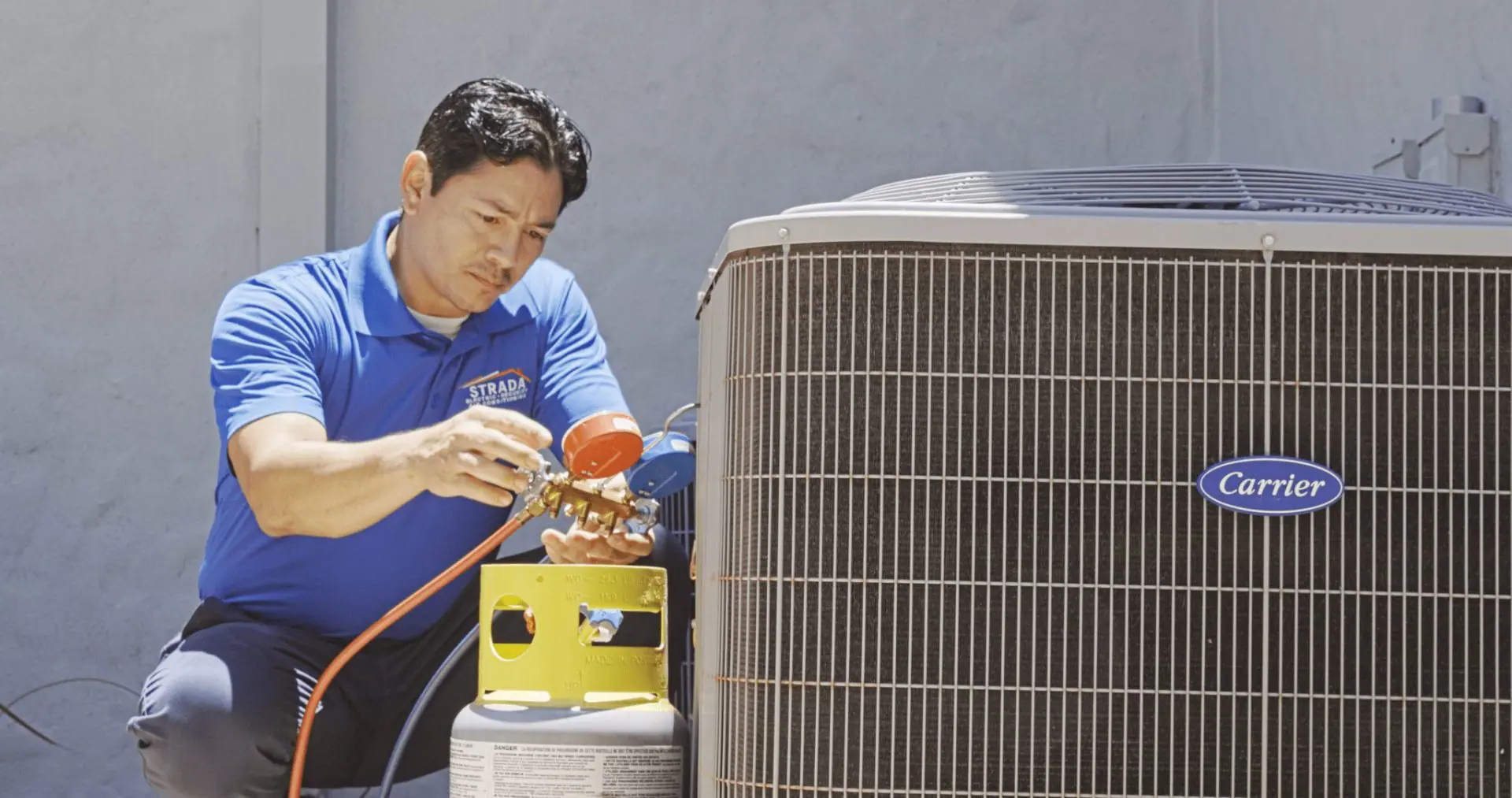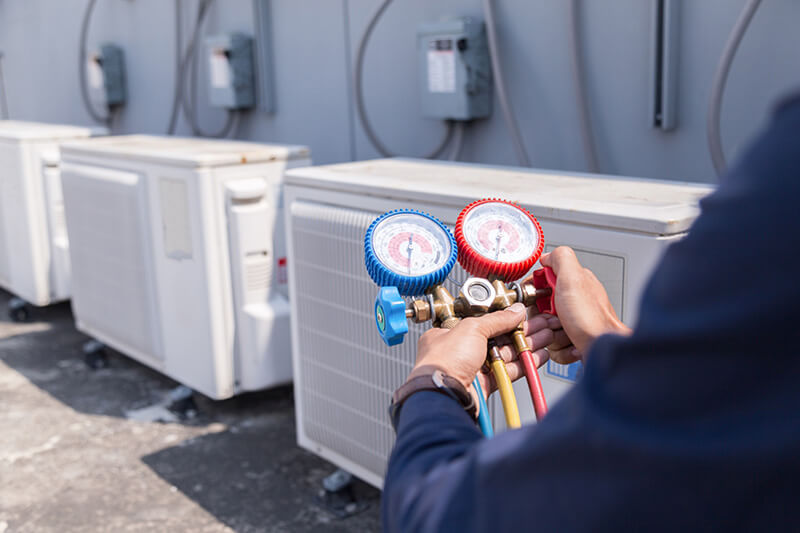Selecting In Between a Heat Pump and Heater: Trick Considerations for Your HVAC Needs
When assessing home heating choices for heating and cooling needs, the choice in between a heatpump and a furnace can be intricate. Each system uses unique advantages tailored to particular environments and power performance objectives. Understanding these distinctions is essential for making an enlightened option. Key variables such as installment costs and ecological impact even more make complex the option procedure. Which option absolutely aligns with one's comfort and sustainability preferences? The complying with areas will certainly explore these factors to consider in detail.
Understanding Warmth Pumps: Exactly How They Work and Their Advantages
While numerous homeowners take into consideration different home heating options, comprehending how warm pumps feature and their advantages can greatly affect their choice. Heatpump operate by transferring warm as opposed to generating it. In the winter season, they extract warmth from the outside air or ground and transfer it inside your home, while in the summertime, they reverse this procedure, cooling down the home by removing warm outside. This twin functionality makes them flexible for year-round environment control.One of the primary benefits of heatpump is their energy efficiency. They utilize considerably much less electrical power contrasted to standard heating unit, possibly leading to reduced utility bills (heat pump replacement ooltewah tn). In addition, heat pumps have a smaller carbon footprint, making them an environmentally pleasant selection. They additionally require much less upkeep than standard systems, adding to long-lasting price savings. Overall, recognizing the mechanics and benefits of heat pumps can assist home owners make notified choices concerning their heating and cooling demands
Exploring Heaters: Kinds, Procedure, and Benefits
Heaters can be found in numerous types, consisting of gas, electrical, and oil versions, each with distinctive functional systems. Comprehending these differences is important, as they influence effectiveness and heating efficiency. Furthermore, furnaces provide countless benefits, such as consistent warm output and reliability in chillier climates.
Kinds of Heaters
Heater can differ substantially in layout and procedure, with furnaces being a preferred option amongst homeowners. There are a number of sorts of heaters, each making use of various gas sources and modern technologies. Gas furnaces are usual, leveraging natural gas to create heat effectively. Electric heating systems, on the various other hand, use electric resistance to generate warmth, commonly preferred for their simple installation. Oil furnaces, while much less usual, are effective in locations with restricted gas accessibility (heat pump installation ooltewah tn). In addition, condensing furnaces maximize energy effectiveness by capturing and reusing exhaust gases. Each type runs through a system of heat exchangers and ductwork to distribute cozy air throughout a home. Recognizing the distinctions between these furnace types is vital for educated a/c choices
Benefits of Heaters
For home owners looking for reputable warmth during chilly months, the advantages of heaters are significant. Heating systems offer regular heating, making sure also temperature levels throughout the home. They are particularly reliable in severe cold, commonly surpassing warm pumps in freezing conditions. Different kinds, including gas, electrical, and oil furnaces, provide versatility to meet varied demands and preferences.Furnaces likewise tend to have lower initial setup costs compared to heatpump, making them a more easily accessible choice for lots of. Their durable layout adds to a longer life expectancy, with many systems lasting over 15 years with appropriate maintenance. In addition, contemporary furnaces are frequently outfitted with advanced innovation for boosted effectiveness, which can bring about minimized power expenses. In general, heaters stay a reputable selection for reliable home heating.

Energy Performance: Contrasting Heat Pumps and Furnaces
When comparing energy efficiency between heatpump and heating systems, the Seasonal Power Performance Proportion (SEER) plays a necessary duty in identifying performance. Furthermore, a functional price analysis reveals the long-lasting monetary implications of each system. Understanding these elements can direct home owners in making informed decisions concerning their heating services.
Seasonal Power Effectiveness Ratio
Power performance plays a crucial duty in the decision-making process in between heatpump and heaters, specifically when considering the Seasonal Energy Efficiency Ratio (SEER) This statistics actions the cooling efficiency of heat pumps over a whole cooling season, supplying a standard way to evaluate efficiency. Greater SEER scores show better energy efficiency, translating to lower power consumption and reduced utility bills. In contrast, furnaces are generally assessed making use of the Annual Fuel Utilization Effectiveness (AFUE) ranking, which mirrors home heating performance. When contrasting these two systems, house owners ought to focus on SEER scores for heatpump, as they directly impact overall energy financial savings and ecological sustainability. A detailed understanding of SEER can especially affect the lasting fulfillment and cost-effectiveness of the selected a/c remedy.
Functional Cost Evaluation
Comprehending the operational costs related to heatpump and heating systems is essential for house owners reviewing their alternatives. Warm pumps typically provide greater energy efficiency, converting electric power into warmth with marginal waste. This causes reduced monthly energy expenses, especially in moderate environments. Alternatively, typical heaters, particularly gas models, might have reduced upfront costs but can incur greater operational expenses over time because of fuel costs and performance ratings.Moreover, heat pumps can work as both heating and cooling systems, potentially decreasing the need for different a/c devices. While preliminary investments for heatpump might be higher, their long-term savings in power effectiveness can make them a much more cost-effective selection for lots of houses. Mindful evaluation of neighborhood energy rates is vital to identify the very best alternative.
Installment Costs: What to Expect for each and every Heating Unit
Installation costs for heater can vary considerably between warmth pumps and heaters, influencing home owners' decisions. Heat pumps typically have higher upfront installation costs, usually ranging from $3,500 to $8,000, depending on the device size and intricacy of setup. This includes the outside unit, indoor handling system, and needed ductwork adjustments. Alternatively, furnaces tend to have lower initial costs, averaging in between $2,500 and $6,000, which can be appealing for budget-conscious home owners. However, installation expenses can enhance if substantial ductwork is required.Moreover, the option of gas type for furnaces-- all-natural gas, lp, or electrical-- can also influence installment costs. While warm pumps supply power performance, their first financial investment might hinder some buyers. Eventually, evaluating installment prices together with long-term cost savings and efficiency will help home owners in making informed choices regarding their furnace.
Climate Factors To Consider: Which System Executes Better in Your Location
Just how do environment conditions affect the efficiency of heater? The efficiency of warm pumps and furnaces can vary considerably depending on the regional environment. In moderate environments, heatpump succeed by effectively transferring heat from the outside air, making them an energy-saving alternative. Their effectiveness reduces in exceptionally cold temperature levels, where they might battle to draw out enough warm. Alternatively, heaters, specifically gas versions, give trustworthy and regular warmth no matter outdoor conditions, making them better in colder regions.In locations that experience milder winter seasons, warmth pumps can run properly year-round, giving both heating and cooling. On the other hand, areas with rough winter seasons often profit from the robustness of furnaces. Eventually, recognizing the local environment is necessary when choosing between a heat pump and a heating system, as it directly impacts their functional performance and general efficiency.
Maintenance Requirements: Long-Term Look After Warmth Pumps vs. Furnaces
While both heat pumps and furnaces call for regular upkeep to guarantee peak see this performance, their specific requirements and care regimens differ considerably. Furnaces generally need less frequent attention, with yearly assessments being sufficient to look for gas leakages, clean filters, and evaluate total capability. Their simpler design commonly enables for simple repairs.In comparison, heatpump necessitate semiannual maintenance because of their twin function in home heating and cooling. This consists of cleansing coils, checking refrigerant levels, and making sure that both the exterior and indoor devices work at their finest. Furthermore, heatpump upkeep typically entails even more elaborate parts, making specialist maintenance essential.Neglecting maintenance can lead to reduced efficiency and enhanced power costs for both systems. useful site Inevitably, property owners must think about these long-term treatment requirements when choosing in between a warm pump and a heating system, as aggressive upkeep can expand the life-span and performance of either system considerably.
Ecological Influence: Selecting a Sustainable Heating Alternative
The environmental influence of heater is an essential assessment for home owners looking for lasting options. Warmth pumps are generally extra energy-efficient than typical furnaces, as they move warmth instead of generate it, significantly lowering carbon discharges. By utilizing renewable resource sources, such as geothermal or air-source warm pumps, home owners can better minimize their environmental footprint.On the other hand, gas heating systems give off greenhouse gases and add to air contamination, though they usually offer higher warmth result. Improvements in technology have led to the growth of high-efficiency heaters that reduce emissions.Ultimately, choosing a heating system involves weighing effectiveness versus ecological effect. Homeowners are encouraged to review neighborhood energy resources and motivations for renewable systems, ensuring a selection that lines up with both individual comfort and environmental obligation. The decision affects not only instant convenience however additionally long-term sustainability and ecological wellness.
Regularly Asked Questions
For How Long Do Warm Pumps and Furnaces Typically Last?
The lifespan of heatpump generally varies from 15 to twenty years, while heating systems can last in between 15 to thirty years. Regular maintenance significantly influences their durability and efficiency in supplying heating remedies.
Can I Utilize a Heatpump in Exceptionally Cold Climates?
Heatpump can run in exceptionally cold climates, however their efficiency diminishes as temperatures decline. In such problems, additional heating sources may be necessary to keep comfy indoor temperatures and guarantee peak performance.

What Is the Sound Level of Warmth Pumps Versus Furnaces?
The sound degrees of heat pumps and furnaces differ considerably. Usually, warm pumps operate even more quietly than traditional heating systems, making them more effective for those delicate to appear, while furnaces might generate louder operational sounds throughout heating cycles.
Are Heat Pumps Suitable for Both Cooling And Heating?
Warmth pumps are indeed appropriate for both cooling and heating (heat pump replacement ooltewah tn). investigate this site They function by moving warmth, offering reliable temperature control year-round, making them a functional option for home owners seeking an all-in-one cooling and heating solution
What Dimension Heater Do I Required for My Home?
Determining the proper dimension furnace for a home calls for evaluating elements such as square video footage, insulation quality, regional environment, and the home's design. Consulting a professional can ensure an exact analysis and excellent comfort. Heat pumps generally offer greater power efficiency, transforming electric energy right into warm with very little waste. In modest environments, heat pumps excel by efficiently transferring heat from the outdoors air, making them an energy-saving alternative. On the other hand, heating systems, specifically gas designs, offer trusted and constant warmth regardless of exterior problems, making them better in colder regions.In locations that experience milder winters months, warm pumps can run successfully year-round, offering both home heating and cooling. Heat pumps are normally much more energy-efficient than typical heaters, as they move warm instead than generate it, greatly lowering carbon emissions. By making use of eco-friendly power resources, such as air-source or geothermal heat pumps, homeowners can further lessen their ecological footprint.On the other hand, natural gas heaters discharge greenhouse gases and contribute to air contamination, though they typically provide higher warm output.